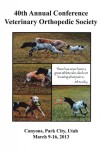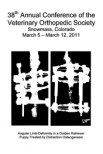Objective
To evaluate biocompatibility of biodegradable sleeves containing antimicrobial agents, designed for local drug delivery to prevent implant-related infection.
Study Design
Synthetic polyester sleeves (a copolymer of glycolide, caprolactone, trimethylene carbonate, lactide) were cast as thin films. The antimicrobial agents incorporated in the sleeves included gentamicin sulfate, triclosan, or a combination of these drugs.
Animals
Adult sheep (n = 15).
Methods
Two limited contact dynamic compression plates (LC-DCP) with or without sleeves were implanted on tibiae (bilateral) of 15 sheep. Sleeves were placed over the plates before implantation. Beneath half of the plates, 5-mm drill hole defects were made in the near cortex. Samples were harvested 4 weeks later for histology and microradiography.
Results
Macroscopically, no irritation of bone or adjacent tissue was seen. Small remnants of sleeves were visible on histology, and positively correlated with the presence of macrophages and foreign body cells. Thick sections showed no difference between the test samples and controls in terms of fibrous capsule formation, periosteal remodeling, and defect remodeling. Inflammatory cells, macrophages, and foreign body cells were more prominent in sections with sleeves, but were not statistically significantly different from controls. Cell numbers were within normal physiologic limits normally seen as cellular response to foreign bodies consisting of polymers.
Conclusion
The normal healing response indicated that the biodegradable sleeves demonstrate tissue biocompatibility.
Biodegradable Sleeves for Metal Implants to Prevent Implant-Associated Infection: An Experimental In Vivo Study in Sheep
Date
April 2012
Journal
Veterinary Surgery
Volume
41
Number
3
Pages
410-421









